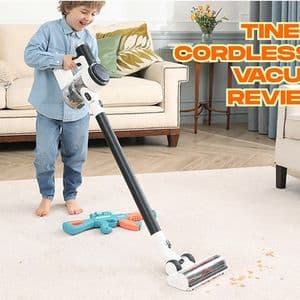Why Dyson Stick Vacuums Are in High Demand
Dyson has carved out a strong position in the vacuum industry thanks to its focus on cordless, bagless, and powerful suction technologies. Over the years, their stick vacuums have become a top choice for homeowners due to their convenience and versatility.
But here’s the catch: they’re not cheap.
While Dyson offers several models, even the most “basic” options tend to sit at the higher end of the price spectrum compared to other brands. That’s why finding a cheaper Dyson stick vacuum often involves trade-offs.
What Qualifies as a “Cheap” Dyson Stick Vacuum?
The term “cheap” is relative.
For Dyson, a “cheap” stick vacuum may still cost more than a top-tier model from other brands. Typically, anything under $400 might be considered affordable in the Dyson lineup. In contrast, some high-end models can cost $600 or more.
So, what makes a Dyson stick vacuum less expensive?
-
Older generation models: Previous versions like the V7 or V8 are usually priced lower than the latest models.
-
Limited accessories: Some variants come with fewer attachments, which reduces the overall price.
-
Shorter battery life: More affordable units may offer less runtime per charge.
-
Less advanced filtration: Cheaper models might lack HEPA filters or whole-machine filtration features.
Key Features to Expect in a Lower-Cost Dyson Stick Vacuum
Here’s what you typically get—and don’t get—when opting for a cheaper model:
What You Might Get
-
Solid suction for basic household cleaning
-
Lightweight design for easy maneuverability
-
Cordless convenience to clean without being tethered to an outlet
What You Might Miss
-
Advanced filtration that captures allergens and fine dust
-
Smart sensors that adjust suction based on floor type
-
Extended battery life for longer cleaning sessions
-
LCD displays and digital controls
So, is the compromise worth it?
Let’s find out by weighing performance against price.
Is Performance Affected in Cheaper Models?
Generally speaking, yes—though not always significantly.
Lower-end Dyson stick vacuums might not include the latest tech enhancements, but they often still deliver reliable performance for everyday cleaning. You may notice reduced suction on thick carpets or quicker battery drain, but for hard floors and light debris, they typically do the job well.
If you're someone who only needs basic floor maintenance rather than deep cleaning or allergen filtration, a cheaper Dyson model could suffice.
Where to Look for the Best Prices
To find the Dyson cordless best price, timing and strategy are key.
Retailers often discount older models during:
-
Major holiday sales (Black Friday, Memorial Day, etc.)
-
End-of-line clearances when new models launch
-
Certified refurbished promotions directly from Dyson or authorized resellers
These sales often bring the price down significantly without sacrificing too much in terms of quality. However, be sure to compare features, return policies, and warranty coverage when evaluating deals.
Understanding Battery Life and Maintenance Costs
Even with a cheap Dyson stick vacuum, long-term usability hinges on the battery and maintenance.
Battery Life
Cheaper models often include lower-capacity batteries, meaning:
-
Shorter runtime (15–30 minutes vs. 60+ on newer models)
-
Longer recharge time
-
Possible need for early battery replacement
Maintenance Costs
While Dyson vacuums are bagless, some parts still require periodic replacement, such as:
-
Filters (washable but may need replacing after extended use)
-
Brush bars or rollers
-
Batteries (especially after 2–3 years of frequent use)
Factoring in these ongoing costs is essential when budgeting for any vacuum purchase.
How Dyson Compares to Other Affordable Brands
If you’re looking to save money, it’s natural to consider competitors offering lower prices. Some brands specialize in budget-friendly cordless vacuums, but they often compromise on build quality, suction power, or longevity.
This leads many consumers to ask: is Fabuletta a good brand?
Fabuletta has emerged as a low-cost alternative in the cordless vacuum market. While its models can be appealing due to their price, they tend to be entry-level in design and performance. For light cleaning needs, they may be acceptable—but don’t expect the same durability or engineering quality that Dyson is known for.
Who Should Buy a Cheaper Dyson Stick Vacuum?
A low-cost Dyson stick vacuum might be the right choice if:
-
You live in a small to mid-sized home or apartment
-
You mostly clean hard floors or low-pile carpets
-
You don’t need all the latest smart features
-
You prefer the build and brand reliability of Dyson, but at a lower cost
On the other hand, if you have pets, allergies, or thick carpets, spending more on a higher-end model—or considering other full-sized vacuum types—might be a better long-term solution.
Tips Before Buying a Cheaper Model
Before you buy, here are some practical tips to avoid regrets:
-
Check model numbers: Different configurations under the same name (like V8 Motorhead vs. V8 Absolute) vary significantly in price and attachments.
-
Read specifications: Compare suction power, bin size, filter type, and battery life.
-
Look at warranty terms: Ensure you understand what’s covered, especially for refurbished units.
-
Avoid impulse buys: If a price seems too good to be true, verify it’s from a reputable source.
Read more: Dyson Vacuum Ratings
Final Thoughts
A cheap Dyson stick vacuum can be a smart option if you’re looking to enjoy Dyson’s cordless convenience without spending top dollar. But understanding what’s included—and what’s not—is key to making sure your expectations align with reality.
Although cheaper models offer limited features compared to their high-end siblings, they still bring the signature Dyson engineering to everyday cleaning. The trick lies in choosing the right model, at the right time, from a trustworthy source.
By staying informed, you’ll be better equipped to decide if a more affordable Dyson stick vacuum fits your needs—or if it’s worth saving a little longer for a more advanced option.
If you found this guide helpful, feel free to share it with others who are also weighing their vacuum choices.










